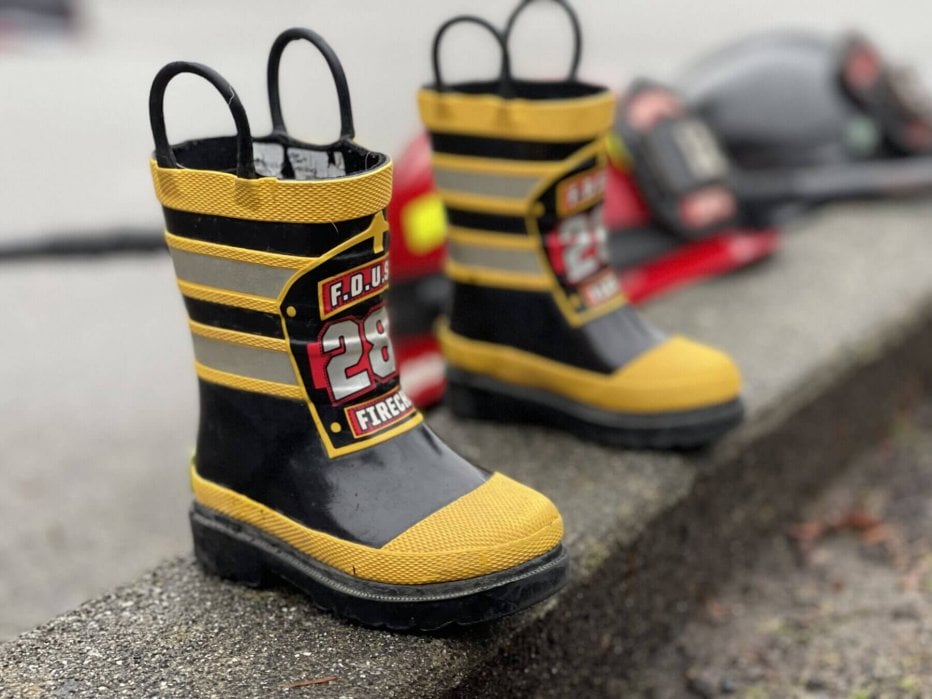From Rookie to Resilient: A First Responder’s Guide

By: Haley Fanning ACP/FF/PT
You are starting as a new recruit. You have trained hard to pass your fire department physical requirements, and you received a clean bill of health from your pre-employment physical. You did everything right – so now it is time to begin the best career in the world.
You get up for your morning run. Your feet rhythmically clear your mind. You can see your breath, but the cold air makes you feel alive. You grab some instant oatmeal and decide to make breakfast at the firehouse as you are running short on time and, as a new recruit, you want to be the first person there. You show up for your shift with your boots shined, uniform pressed, and head to the kitchen for breakfast during your tailgate meeting.
The senior guy looks at your oatmeal in disgust, “What is that? Get out and start work!” You hide the oatmeal away and pour yourself a coffee. You respond to him by asking, “Aren’t you starving? I went for my run this morning and I can’t wait until lunch.” The crew comes in and they all laugh at you and shake their heads.
“Just you wait Rook, you will see what a couple of years on the career will do to that morning run”
You shake it off, as to be a firefighter you have to be healthy. You must be relied on by your comrades. You all had to pass physical requirements to be here – to prove you had what it takes for the job! The day is long, but you’re there for it. You tune out the complaints because everything is fresh, new and exciting. The sun is setting, and you feel exhausted, but you drag yourself to the gym.
By the end of your second day shift you’re mentally and physically exhausted, but you don’t want to miss out on long-change beers with the guys. You skip your workout and get a horrible sleep, which leads you to skip your run before the night shift. You make a mental pact to get it done before your nap the next day since you often struggle to sleep post-night shift. You have a lot of errands to do before your last night, so you skip your nap and end up missing your run.
You made it to your days off. You turn up the air conditioner on the way home because you fear falling asleep. You regret the burger run, and the third helping of lasagna because your stomach doesn’t feel quite right. By your next tour, you have abandoned your fitness routine completely. You grab fast food on your way to work instead of bringing oatmeal, and you wonder what happened to your drive and motivation.
Does this story sound all too familiar? Fire school, fire training, and recruit class all preach to new members the importance of physical and mental health and well-being, but when you arrive at your dream career – this message often gets convoluted.
The science is clear, those who work night shifts will have a shorter life. The adrenaline of being jolted awake causes cardiac havoc and mental instability. Then we add energy drinks, and alcohol in between shifts, and make poor nutrition choices that really compound all these negative health consequences.
Your career is not a sprint but a marathon, and to make it to the finish line you need to make choices that give you every opportunity to battle mental health, lack of sleep, cardiac stress, physical demand, long days, and everything else that comes with being a first responder.
Instead of being reactive, tired, and unable to complete any of your health and fitness goals, make a plan. If you are exhausted and unable to recover – you will never complete any of your fitness ambitions, even if your goal is just to maintain your current fitness level.
Be the change you want to see. Choose team workouts instead of team tequila shots. Promote sleep and sleep hygiene, especially for new recruits! Make healthy meal choices for you and your crew, and if someone is making the effort to clean up their nutrition – support them.
Here are my top tips for developing a health and fitness routine as a first responder.
- Plan for rest days or horrible workouts around your night shifts. You need recovery. Your body needs sleep. Stress, even in the form of mental stress, is still STRESS. So, plan for the fact that you might be working all night, and overtime.
- Firehouse meals can be carb and fat-heavy. Take a food container with you and divide your portion into two. If there are sauces, gravy, or a lot of cheese added – ask for those to be put on the side so you can get a better idea of how much fat and carbohydrates you are consuming. Better yet, challenge your crew to make their already delicious recipes more nutritious!
- Sleep 7-9 hours a night. This is a tough one however, research indicates that while previous studies recommended 6 hours of sleep minimum – 7 minimum is really pushing it for most people. Develop a good sleep hygiene routine. Sleep in a completely blacked-out room, as light inhibits your pineal gland from secreting melatonin, a hormone that promotes drowsiness. Monitor your caffeine use and figure out when you should stop taking caffeine to have good quality sleep.
- Make a program you can follow or get professional help when planning your workout routine. Strength training can diminish your chance of injury. Firefighters often do high load, repetitive motions and should be mindful of building up stabilizer muscles and lateral strength. Firefighters should do some form of cardio for cardio-pulmonary health but choose a time and type of cardio that you can actually stick to.
- Try to plan some team bonding activities that do not include alcohol or binge drinking. Nothing wrong with having a beer, but the new alcohol guidelines do recommend far less than the average person is consuming, and binge drinking in between shifts is the opposite of recovery. Non-alcoholic beers are a great post-workout drink, and there are lots of fun activities out there that offer the same team bonding and mental unwind as going for drinks, without all the health consequences.
Look ahead to your retirement and visualize what you want to be doing and accomplishing. If you can look that far ahead, you will be able to impact your entire career positively. If you want to be injury-free, fit, and happy – don’t allow yourself to take the path that ends in cardiac disease, mental health struggles, and physical injury. Find a mentor who is close to retirement and who exhibits the health and fitness qualities that you aspire to have when you retire.
Gain allies that will support you in your health and fitness goals. As a personal trainer, I offer free programming to all first responders, and there are lots of supports in place for those who are struggling with maintaining physical and mental health and wellness. Remember, the goal is not perfection, but consistency!
By: Stephen Baer
Podcast
Contests & Promotions
















